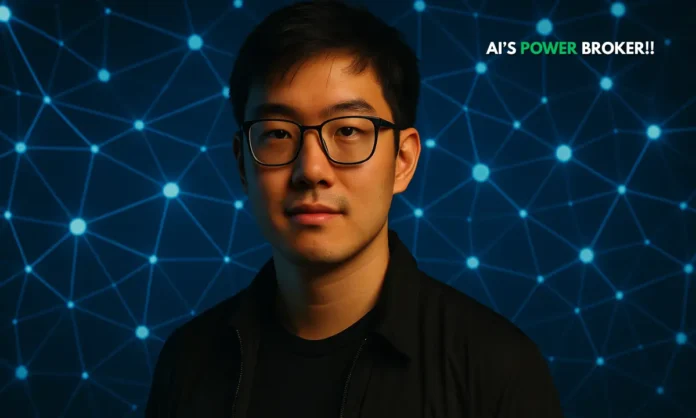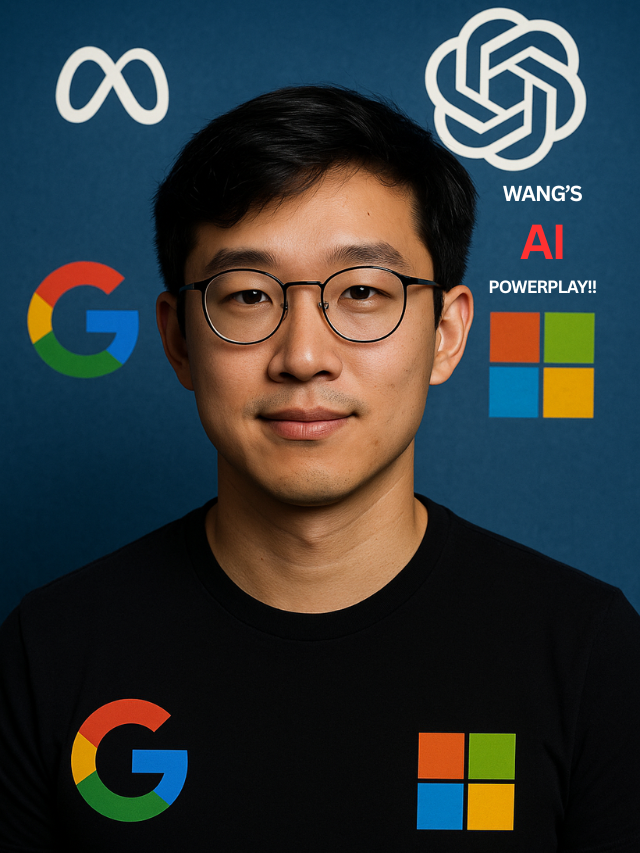SUMMARY
- Meta’s $14.3B investment in Scale AI places Alexandr Wang at the center of Silicon Valley’s AI intelligence race.
- Wang’s elite network, political alliances, and military contracts make him more than a technologist—he’s now a geopolitical influencer.
- Meta’s gamble gives it insider access to rivals like OpenAI, risks triggering antitrust alarms, and cements a controversial realignment with Trump-era power blocs.
When Influence Becomes Infrastructure: Why Alexandr Wang Matters Now
Alexandr Wang, the 28-year-old co-founder of Scale AI, just became one of the most powerful people in artificial intelligence—and not just because of money. Meta’s $14.3 billion investment into Wang’s company has not only placed him directly under Mark Zuckerberg’s superintelligence group, but also turned him into the most well-connected “network operator” in the global AI race.
Why now? As big tech companies pivot from building flashy AI models to controlling the infrastructure that powers them—data pipelines, government contracts, and military-grade alignment protocols—Wang’s real value isn’t code. It’s access. He knows what OpenAI, Google DeepMind, Amazon, and defense agencies are doing—before most reporters, analysts, or even CTOs do. And with Meta now owning 49% of Scale, Zuckerberg has bought something none of his rivals can easily replicate: the social graph of elite AI intelligence.
This story is more than a corporate acquisition. It’s about politics, data supremacy, and an emerging ecosystem where charisma, proximity to power, and ideology intersect to shape AI’s future. And Alexandr Wang might just be the first founder to ride those currents with deliberate, calibrated flair.
🚨 META invests $14.3 billion in Scale AI, taking a 49% stake. As a part of deal, 28 years old founder, Alexandr Wang lead Meta's Ai Superintelligence team. pic.twitter.com/mlw9xezfSZ
— 🚨GlobalX (@GlobalXInt) June 13, 2025
Meta’s Masterstroke: Data, Access, and AI Intel
- Scale AI isn’t a model-builder—it powers them with human-labeled data essential for training.
- Meta’s 49% stake gives it strategic leverage over OpenAI, Google, Amazon, and others.
- Wang’s appointment to Meta’s superintelligence team deepens Mark Zuckerberg’s personal influence on AI direction.
At face value, Meta’s deal with Scale looks like a typical AI arms race maneuver. Microsoft has OpenAI, Amazon has Anthropic, and now Meta has… a data labeller? But this isn’t about models. Scale AI’s business—providing curated training data—means it’s the neural tissue behind every major AI brain. Even OpenAI and Google depend on it.
Zuckerberg’s move is subtle but strategic: while others battle over flashy chatbot features, Meta now owns a choke point in the supply chain. If OpenAI wants to continue using Scale (it reportedly will), it effectively funds a rival. If it exits, it slows down. Google, reportedly planning to cut ties, will now need to rebuild data ops at scale—no easy feat in an AI gold rush.
Wang’s own appointment in Meta’s “superintelligence” division is even more telling. Unlike other AI recruits with PhDs or research chops, Wang’s value lies in intelligence—industrial and interpersonal. He knows who’s building what, who’s failing quietly, and where the next breakthrough might happen. Meta, once trailing in foundational AI, may now leapfrog forward—not by building faster, but by knowing earlier.
Billionaire, Power Broker, Right-Wing Whisperer
- Wang’s political networking extends into Trump circles, defense departments, and conservative influencers.
- His “MEI” hiring philosophy rejects DEI norms, aligning him with post-2024 right-wing corporate trends.
- Scale AI has secured over $340M in U.S. government contracts and is now seen as a defense-tech bridge.
Wang’s genius isn’t just technical. It’s cultural. Since founding Scale AI at 19 and ousting his co-founder Lucy Guo, he’s navigated Silicon Valley’s elite while quietly building political capital in Washington. His shift toward “MEI”—merit, excellence, intelligence—as a hiring ethos was more than branding. It was a calculated signal to a post-woke, Trump-aligned America.
By attending Trump’s 2025 inauguration, hobnobbing with YouTube influencers from the manosphere, and appearing on Theo Von’s podcast in a “GODSPEED” trucker hat, Wang has transformed into the first true AI influencer-candidate: part scientist, part political asset, part cultural avatar. He isn’t just courting venture capitalists anymore—he’s courting senators, Pentagon strategists, and future voters.
Meta’s investment, then, is more than commercial. It’s ideological. Zuckerberg’s recent rollback of diversity efforts and shift toward right-leaning platforms mirror Wang’s trajectory. Together, they signal a new era in tech—one where billionaire founders openly align with nationalist politics and play global AI like a zero-sum geopolitical game.
Code, Conflict, and the Future of AI’s Power Grid
- Scale’s rise raises antitrust questions as rivals depend on a Meta-partnered infrastructure firm.
- Wang’s government contracts place him at the heart of military AI procurement.
- The cultural shift within AI—away from academic openness toward defense-driven secrecy—is accelerating.
What happens when the most connected man in AI joins forces with the richest platforms and the most powerful state apparatus? Regulation, conflict, and realignment.
Already, questions are surfacing about whether Meta’s investment in a key AI infrastructure firm will prompt antitrust scrutiny. Scale isn’t just a tool—it’s a dependency. Meanwhile, Wang’s tight relationships with the U.S. Department of Defense, and Scale’s $250M+ contracts to supply AI services to the military, position him as a central player in the militarization of AI.
His critics argue that he’s commercialized surveillance, commodified data labor in the Global South, and accelerated the erosion of ethical guardrails in AI. His defenders say he’s a visionary realist—a builder who understands that the real AI war isn’t in codebases, but in alliances.
One thing is clear: with this Meta-Scale deal, the future of AI looks less like open-source collaboration and more like a Cold War-style network of influence, funding, and mutually assured disruption.
Silicon Valley’s Crown Prince of Alignment
Alexandr Wang is no longer just the “data guy” in the back office of AI development. He is now Silicon Valley’s go-to power node—someone who fuses military-grade infrastructure, billion-dollar valuations, and political clairvoyance with an unrelenting personal brand. Meta has invested not just in Scale AI, but in an ideology. One that prioritizes speed over scrutiny, leverage over openness, and geopolitical dominance over collective advancement.
In doing so, Zuckerberg and Wang may have redrawn the future of artificial intelligence—not with code, but with connections.



